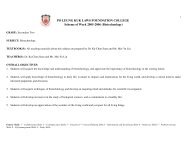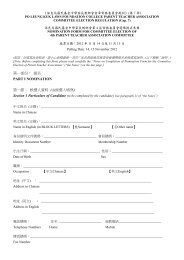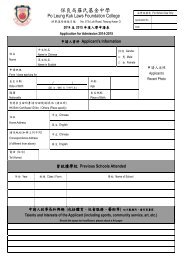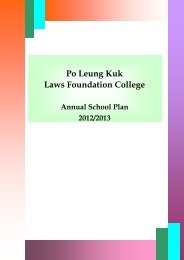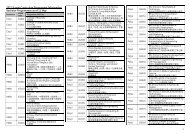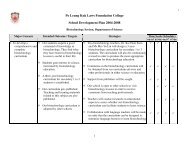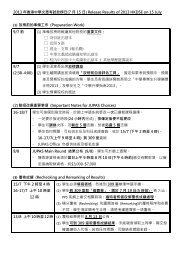Po Leung Kuk Laws Foundation College
Po Leung Kuk Laws Foundation College
Po Leung Kuk Laws Foundation College
You also want an ePaper? Increase the reach of your titles
YUMPU automatically turns print PDFs into web optimized ePapers that Google loves.
<strong>Po</strong> <strong>Leung</strong> <strong>Kuk</strong><br />
<strong>Laws</strong> <strong>Foundation</strong> <strong>College</strong><br />
School Report<br />
2009-2010<br />
Address: 8, To Lok Road, Tseung Kwan O Tel: 2701 8778 Fax: 2701 3866<br />
Website: http://www.plklfc.edu.hk Email: plklfc@yahoo.com.hk
Content<br />
Items<br />
Page<br />
A Our Belief 3<br />
B Our Mission 3<br />
C Our School 4<br />
D Our Students 9<br />
E Our Teachers 9<br />
F Evaluation on Major Concerns (ASP) 2009-2010 11<br />
G Evaluation on Key Measures taken by various Committees. 17<br />
H Financial Summary 22<br />
I Performance of Students 26<br />
Appendix 1: Principal’s Professional Development<br />
2
A. Our Belief<br />
We strongly believe that,<br />
<br />
The overall aims of education for the 21st Century should be to enable every person to<br />
attain all-round development and to be capable of life-long learning.<br />
<br />
Our priority should be to enable students to enjoy learning, enhance their effectiveness in<br />
communication and develop their creativity and sense of commitment.<br />
<br />
‘Developing Information Technology in Education’ and ‘Cultivating Students’ Multiple<br />
Intelligence’ should be the two major directions of our curriculum development that aims to<br />
cultivate the following generic skills, including self-learning skills, creative thinking skill,<br />
communication skill, collaboration skill and problem solving skill.<br />
<br />
All students are unique and their potential and multiple intelligence can be fully developed<br />
if ample opportunities are duly provided.<br />
<br />
The development of student’s multiple intelligence helps to strengthen their confidence and<br />
to bring out their giftedness.<br />
B. Our Mission<br />
We commit ourselves....<br />
To create a loving and harmonious learning environment which helps students to,<br />
<br />
<br />
<br />
<br />
<br />
develop self-esteem and optimism;<br />
pursue knowledge and truths, accept multi-cultures and have a world vision;<br />
think creatively and cope with changes;<br />
undertake the responsibility to the family and individuals; and serve the community;<br />
better understand Chinese history and culture; be concerned with the development of our<br />
country.<br />
We strive....<br />
<br />
For creating a professional environment to,<br />
• encourage professional collaboration and cultivate the culture of quality assurance;<br />
• make good use of educational researches to enhance teaching and learning, and also<br />
to promote teachers' professional development;<br />
3
• facilitate an innovative curriculum development in response to the needs of students<br />
and social changes.<br />
<br />
For developing an effective partnership network among the school, students' families and<br />
the community towards the accomplishment of the vision of 'all-round development for<br />
students'.<br />
C. Our School<br />
1. Introduction of the school<br />
<strong>Po</strong> <strong>Leung</strong> <strong>Kuk</strong> <strong>Laws</strong> <strong>Foundation</strong> <strong>College</strong> was founded in 2004. It is a Direct subsidy<br />
co-educational Anglo-Chinese secondary School managed by <strong>Po</strong> <strong>Leung</strong> <strong>Kuk</strong>.<br />
Core curriculum<br />
Our school curriculum, structured to maintain both breath and balance, is designed<br />
to cater for students’ different needs, abilities and interests. The 8 key Learning Areas<br />
advocated by the Curriculum Development Council will form the backbone of school<br />
curriculum. A strong emphasis on ‘language has a central role in learning’ and ‘a<br />
coherent, progressive and diversified career oriented curriculum for senior secondary<br />
students’ serves to ensure a smooth transition from primary to secondary and to prepare<br />
students for lifelong learning and for career development.<br />
The core of our Junior Secondary Curriculum consists of fifthteen subjects, i.e.<br />
Chinese Language, English, Mathematics, Integrated Science, Biotechnology, Integrated<br />
Humanities, Chinese History, Computer and Information Technology, Home Economics,<br />
Music, Visual Arts, Physical Education and Life Education.<br />
The core of our Secondary 4 consists of 4 subjects, i.e. Chinese Language, English,<br />
Mathematics and Liberal Studies. Moreover, our school offers Mathematics Module 1<br />
and 2, Physics, Chemistry, Biology, Combined Science, BAFS, Economics, Chinese<br />
Literature, Geography and Chinese History as electives.<br />
Language permeates the whole curriculum both as the vehicle for learning and as an<br />
object of study in its own right. English is the teaching medium for our formal curriculum<br />
except Chinese Language, Chinese History; while Putonghua is the teaching medium of<br />
the said two subjects.<br />
4
House system and Student Council<br />
The school is divided into four Houses: Blue, Green, Red and Yellow, for the purpose of<br />
sport and other competitions. Each new student admitted to the school is allocated to one<br />
House. He/she remains a member of that House for the rest of his/her school life.<br />
Aims:<br />
1. To provide opportunities to students in different activities.<br />
2. To promote a positive attitude, fair play and sportsmanship towards different<br />
competitions.<br />
3. To build up team spirit towards their houses.<br />
4. To build up a positive and trusting relationship between teachers and students.<br />
5. To provide a support system that promote continuity and personal relationship.<br />
Student Council, founded since 2007, was formed to grant students authorities,<br />
obligations and rights to help build and manage our school. We believe that students, as<br />
one of the owners of this school, should be given autonomy and responsibility to voice<br />
out, participate and manage. We believe that a better school, a sense of belonging and a<br />
spirit of democracy should be built and exercised under substantial enthusiasm and<br />
cooperation among all individuals, especially teachers and students.<br />
Facilities<br />
The school is a millennium school campus of about 7,000 square metres. With the<br />
school-wide optical fibre network, wireless network and 532 UTP network points, all<br />
classrooms, science laboratories and special rooms are connected to the Internet and<br />
equipped with personal computers, projectors, visualizers, DVD players, TV box to<br />
facilitate teaching and learning with information technology.<br />
The Biotechnology laboratories, Integrated science laboratory, Physics laboratory,<br />
Chemistry laboratory, Biology laboratory , Geography & History room, Home<br />
Economics Room and Induction Cookery Room for academic and cultural subjects, the<br />
Grand Lecture Theatre and the School Library provide opportunities for students to<br />
conduct information technology to navigate for information and create knowledge<br />
independently and collaboratively.<br />
The Campus TV studio situated on the 7/F can provide students an opportunity to<br />
experience different duties, such as the operational procedures of a television company.<br />
This can help strengthen their language skills, collaboration skills, critical thinking skills<br />
and life-long learning skills.<br />
5
Adjacent to the campus TV is a Lecture theatre of 83 seats. The major function of the<br />
theatre is to hold lectures and video conferences.<br />
The 3 computer rooms in our school contain 120 computers in total. All rooms are<br />
equipped with Multi-media learning centre (MMLC) facilities and available for students<br />
to use after school every day.<br />
Class Structure<br />
In the academic year of 2009-2010, there were 747 Secondary 1 to Secondary 6 students<br />
in our school. Students are randomly assigned into five classes without ability grouping.<br />
To cater for the different needs, talents of the students and maintain a small class size to<br />
facilitate the teaching and learning, some Secondary 1 to Secondary 3 classes will be split<br />
with mixed-abilities. This policy is applicable to the following subjects:<br />
1) English<br />
2) Chinese<br />
3) Mathematics<br />
4) Integrated Humanities<br />
5) Home Economics<br />
School Advisors<br />
Panel of School Advisors - Partnerships for Growth<br />
Strategic direction and policy environment<br />
• Professor Allan David Walker (Chairman, Department of Educational<br />
Administration and <strong>Po</strong>licy, CUHK)<br />
• Professor Cheung Kwok Wah (Associate Professor, Faculty of Education, HKU)<br />
Teaching, learning and curriculum - Bilingual Education<br />
• Professor Lee Chi Kin John (Dean of Education, Professor, CUHK)<br />
• Professor Man Yee Fun Evelyn (Assistant Professor, Development of Curriculum<br />
and Instruction, CUHK)<br />
6
Teaching, learning and curriculum - Biotechnology<br />
• Professor Yuk-lam LO (Honourary Life Chairman, Hong Kong Biotechnology<br />
Association, President, PerkinElmer Life and Analytical Sciences)<br />
• Professor Kwok-fai SO (Head of Department, Department of Anatomy, Faculty of<br />
Medicine, The University of Hong Kong)<br />
• Dr. Ken Kin-Lam YUNG (Associate Professor, Department of Biology, Hong Kong<br />
Baptist University)<br />
• Dr. Raymond Chuen-Chung CHANG (Research Assistant Professor, Department of<br />
Anatomy, Faculty of Medicine, The University of Hong Kong)<br />
Principal and teacher growth and development<br />
<br />
Professor Ng Ho Ming (Associate Professor, Faculty of Education, HKU)<br />
Quality assurance and accountability<br />
<br />
Dr. Mok Mo Ching Magdelena (Principal Lecturer, Department of Education<br />
Psychology, counseling and Learning Needs, HKIEd)<br />
Home School Cooperation<br />
• Professor Cheung Kwok Wah (Associate Professor, faculty of Education, HKU;<br />
Chairman, Committee on Home-School Cooperation)<br />
Arts Education<br />
Arts Education – contributing to whole person development<br />
As a ‘through-train’ secondary school, we strive to build on the excellent achievement of<br />
our affiliated primary school, <strong>Po</strong> <strong>Leung</strong> <strong>Kuk</strong> Luk Hing To Primary School, winner of the<br />
Outstanding School Award 2001 and the Outstanding Arts Education Award in 2000 and<br />
2003 respectively.<br />
The two streams of our Arts Education, Music and Visual Arts, will play an important<br />
role for developing students’ creativity and contributing to their whole-person<br />
development.<br />
Our music education is not mandated for the small number of Music talents but to all our<br />
students. We encourage all our students to gain rich and comprehensive music<br />
experiences through participating in integrated activities of creating, performing and<br />
7
listening; to develop music skills, construct knowledge in music, and cultivate positive<br />
values and attitudes.<br />
Our Visual Arts curriculum aims to broaden students’ perspectives through exploring arts<br />
and cultures.<br />
2. School Incorporated Management Commmittee<br />
Our Incorporated Management Committee has been formed since June 2008. There are<br />
altogether 12 registered School Managers, which consist of 2 Teacher Managers and 2 Parent<br />
Managers, covenants to conduct the school in an efficient and proper manner and in<br />
accordance with the Education Ordinance, Hong Kong Special Administrative Region.<br />
3. Number of Active School Days - 193 Days (Secondary 1 – Secondary 6)<br />
4. Lesson Time for the 8 Key Learning Areas<br />
Percentage of lesson for the 8 Key Learning Areas<br />
20%<br />
15%<br />
10%<br />
5%<br />
0%<br />
Chinese<br />
Language<br />
Education<br />
English<br />
Language<br />
Education<br />
Mathematics<br />
Education<br />
Personal,<br />
Social &<br />
Humanities<br />
Education<br />
Science<br />
Education<br />
Technology<br />
Education<br />
Arts Education<br />
Physical<br />
Education<br />
8
Percentage<br />
D. Our Student<br />
1. Class Organization (2009/2010)<br />
Level: S1 S2 S3 S4 S5 S6<br />
No. of Classes: 5 5 5 5 5 2<br />
Total Enrolment: 110 144 189 130 132 41<br />
2. Students’ Attendance<br />
Students' Attendance by Grade Level 2006-07 2009-2010<br />
100.0%<br />
98.8%<br />
S1 - S3<br />
80.0%<br />
S1 – S1-S3 S6<br />
E. Our Teachers<br />
1. Teachers’ Qualifications<br />
There were 62 regular teachers (including 4 NET), 3 teaching assisants, 1 assistant graduate<br />
master, 1 social worker, 3 laboratory technicians, 2 information technology technician, 4<br />
secretaries, 1 accountant, and 7 full-time janitors. The teachers’ qualifications were shown<br />
below:<br />
Qualifications<br />
No.(Percentage)<br />
Doctoral Degree 2 (3%)<br />
Master Degree 28 (45%)<br />
Bachelor Degree 62 (100%)<br />
English Teachers meeting Language Proficiency Requirement 11 (100%)<br />
Putonghua Teachers meeting Language Proficiency Requirement 11 (100%)<br />
Total number of teaching staff 62<br />
9
2. Teachers’ Experience<br />
Teachers' Experience<br />
0-2 years<br />
3-5 years<br />
6-10 years<br />
over 10 years<br />
3. Principal’s Professional Development 2009/10 - 224 hours<br />
* Please also refer to Appendix 1.<br />
10
F. Evaluation on Major Concerns<br />
Major Concern 1: To implement a system approach for the Goal Setting Exercise for<br />
students.<br />
Strategies<br />
<br />
The Academic Board is<br />
responsible to design and<br />
to monitor the goal<br />
setting exercise for senior<br />
form students, with due<br />
emphasis on academic<br />
advancement.<br />
Evaluation<br />
Goal Setting Exercise (S4-S6)<br />
This was a new scheme for our school to enhance students’<br />
motivation in learning so as for successful learning. The<br />
goal-setting exercise adopted different theoretical<br />
perspectives about motivation to help students set mastery<br />
goals, performance goals and social goals as these goals<br />
could be a regulator of expectancy.<br />
For senior forms students, they mainly set the goals related to<br />
academic development. Each of the students received a<br />
goal-setting booklet which was tailor-made for different<br />
forms and then students had to set the goals at the start of the<br />
academic year. Class teachers helped reviewed the<br />
performance of their students. Two evaluation exercises were<br />
done during the year.<br />
Evaluation and comments from class teachers indicated that<br />
most of the students set their goals considerately and<br />
seriously. The goals can act as a motivator for students to<br />
study hard. More importantly, the goals set by students were<br />
appreciated and encouraged by their parents.<br />
All S.5 students were also asked to set their goals related to<br />
HKCEE and future career development. Taking our HKCEE<br />
results as an evaluation reference, there were increases in<br />
both the passing rate and credit-to-distinction rate in many<br />
subjects in 2010 when compared to the HKCEE results in<br />
2009.<br />
From the learning and teaching evaluation exercise done at<br />
the end of 1 st term and 2 nd term of the academic year of<br />
2009-2010, whole-school data indicated that students showed<br />
a greater motivation towards learning, when compared to the<br />
data in 2006-2009.<br />
From the data of the stakeholder survey, most students<br />
commented that they did homework seriously and took the<br />
initiatives to learn. These comments indicated that the<br />
students had a high motivation to learn and developed<br />
self-regulated learning.<br />
<br />
The Pastoral Care Board<br />
is responsible to design<br />
and to monitor the goal<br />
setting exercise for junior<br />
Goal Setting Exercise (S1-S3)<br />
A booklet of goal setting was introduced to students in this<br />
year. We aim at developing students’ ability in different<br />
domains including behavior, inter-personal skill and learning
form students, with due<br />
emphasis on<br />
strengthening students’<br />
moral integrity and the<br />
development of a caring<br />
spirit and student<br />
capacity for<br />
self-discipline and<br />
self-care.<br />
attitude. It is a useful tool for class teachers to review<br />
students’ performance. (For evaluation, please refer to the<br />
attachment)<br />
Evaluation on the questionnaire result (Phase<br />
1—October)<br />
By the questionnaires, 26 students were screened out as they<br />
have shown a relatively low score ( 2) in at least one of the<br />
following named aspects including sense of belonging to<br />
school, motivation of revision and doing homework and their<br />
time management skills. Coincidentally, most of the low<br />
scorers were repeaters who shared a poor learning attitude<br />
and suffered from low self esteem.<br />
For these students, we suggested that a discipline or<br />
counseling teacher should act as a mentor in order to<br />
communicate with, provide preliminary counseling service<br />
to, supervise and encourage these students who need special<br />
care and concerns.<br />
Besides, we would like to recommend or refer them to a new<br />
program called Team Challenge, which is aiming at<br />
stretching the potential and improving the shortcomings of<br />
students.<br />
Evaluation on the system approach (Phase 2—February)<br />
An evaluation session was held for collecting teachers’<br />
comments towards the goal setting approach, comments were<br />
summarized as follows:<br />
Class teachers from secondary one suggested that elegant<br />
designed booklets should be made in order to motivate our<br />
students. Moreover, the booklet should be made in a<br />
three-year format so that student can review their previous<br />
performance.<br />
Class teachers also expressed that some rewards should be<br />
supplemented and implemented to the goal setting program.<br />
It could highly motivate students’ involvement.<br />
Class teachers from secondary two appreciated that the<br />
quality of students’ works was high because of the serious<br />
reflection, the setting of specific goals and the<br />
implementation of plan.<br />
Class teachers from secondary three expressed that the<br />
workload was a little bit heavy due to the relatively high<br />
class capacity. A longer reflection period was asked for<br />
alleviating the problem.<br />
12
Evaluation on excellent works and good practices (Phase<br />
3—April)<br />
Some excellent works of goal setting programs were found.<br />
Those excellent works included a serious and detailed<br />
reflection, a specific and practical goal and workable<br />
procedures which to achieve the goal. Moreover, positive<br />
feedbacks and encouragements from teachers contribute<br />
much to motivate our students.<br />
We suggested that we should keep a copy of those excellent<br />
works. Appreciation from class teachers should be given to<br />
students as to reaffirm their determination.<br />
Besides, some good practices set beforehand in March should<br />
be written down onto the booklet as a reminder to enhance<br />
the self-discipline.<br />
Major Concern 2: To further enhance our Quality Assurance Mechanism to strengthen<br />
teachers’ professional development.<br />
Strategies<br />
<br />
<br />
<br />
<br />
Lesson observation<br />
• Departmental Q.A. on<br />
teaching and learning<br />
• School-wide Q.A. on<br />
classroom management<br />
Evaluation of examination<br />
papers<br />
• Making use of item<br />
analysis to strengthen<br />
assessment of learning<br />
and assessment for<br />
learning<br />
New teachers induction<br />
• Beginning teachers are<br />
expected to be<br />
accountable in their<br />
work, whilst their<br />
learning is supported<br />
and facilitated by<br />
mentors, mentees<br />
benefit most from being<br />
proactive themselves<br />
and taking responsibility<br />
for learning in the<br />
workplace.<br />
Teachers’ continuous<br />
professional development<br />
Evaluation<br />
In order to further enhance the quality of teaching and<br />
learning, lesson observation exercise was done in both 1 st<br />
and 2 nd term of the academic year of 2009-2010. Each<br />
subject department had completed at least two lesson<br />
observation exercises in 2009-2010. In each of the<br />
exercise, teachers observed at least two lessons from<br />
other colleagues. The observation focus was how to<br />
create an interactive lesson. Teachers commented that<br />
cooperative learning, group discussion and presentation<br />
were adopted to promote student’s active learning.<br />
Besides, regular lesson observation was done by Heads<br />
of department and senior members to help fresh teachers<br />
to promote their teaching effectiveness. Comments from<br />
most teachers indicated that lesson observation was a<br />
good practice to promote teaching effectiveness. It was<br />
suggested that more lesson observations could be done to<br />
further promote the peer learning culture among teachers.<br />
Examination policy was reinforced to assure the quality<br />
of examination paper and to review student’s learning by<br />
examination reports. All departments (not applicable to<br />
departments of Chinese and English as they had another<br />
strategy to assure the quality of examination paper) had<br />
followed the procedures to produce examination question<br />
analysis. To analyze student’s learning and performance<br />
in the examination, an examination report was produced<br />
by each marker of the examination. This examination<br />
policy was agreed to enhance the quality of assurance in<br />
examination papers.<br />
13
(CPD)<br />
• Strengthening the<br />
recording, reporting and<br />
self-evaluation system<br />
of teacher attending<br />
NSS workshop or<br />
relevant professional<br />
development program,<br />
with due emphasis on<br />
action learning and the<br />
soft-target of 150 hours<br />
per 3 years.<br />
To support three new teachers, a department-based<br />
mentoring programme was continued. Each department<br />
had a mentor teacher to support new teacher’s school life<br />
including teaching practice and other school logistics.<br />
Heads of department had a key role to monitor the<br />
teaching quality of the new teachers. It was commented<br />
that the support was sufficient.<br />
For teacher’s professional development, a<br />
department-based record of teacher’s attendance in<br />
external seminars and courses had been established.<br />
Heads of department indicated that this record was useful<br />
for them to plan the development of the department. The<br />
total hours of attendance of all teachers in external<br />
seminars and courses were at least 774 (i.e. about 13<br />
hours per teacher) in the academic year of 2009-2010.<br />
For the school-based staff development session on<br />
regular Thursdays, there were totally 27 co-planning<br />
sessions held in 2009-2010. In the co-planning sessions,<br />
subject teachers grouped to co-plan their coming<br />
teaching topics. Internal training sessions were also<br />
included in the 27 co-planning sessions. The training was<br />
department-based program so as to facilitate<br />
departmental development. To further promote teaching<br />
profession, all departments had completed at least one<br />
lesson study in 2009-2010.<br />
Major Concern 3: To nurture a positive school culture and school norm through Other<br />
Learning Experiences and ECA.<br />
Strategies<br />
<br />
<br />
Valuing support for student<br />
growth and clarifying its role<br />
in curriculum<br />
• Use data collected<br />
through APASO and<br />
stakeholder<br />
questionnaire survey to<br />
learn about students’<br />
needs and to map out<br />
the school’s major<br />
concern related to the<br />
support for student<br />
growth.<br />
Implementing key tasks and<br />
enhancing coherence and<br />
coordination<br />
• Use goal-setting<br />
exercise as a means to<br />
strengthen students’<br />
Evaluation<br />
According to the development of our school and also the<br />
data from APASO (General Self, Social Self, Values and<br />
Responsibilities), our school has arranged some key<br />
programmes to encourage positive school culture so as to<br />
improve monitoring. For example, the Head Prefect<br />
Election, Goal Setting exercise and Moral Education<br />
Programme during the Class teacher period.<br />
Goal Setting Exercise<br />
Information could be found in the evaluation of Priority<br />
task 1.<br />
Head Prefect Election<br />
The objectives of this activity are to create an election<br />
atmosphere among students, develop the needed ability<br />
among those election candidates and encourage students<br />
pay more concerns to our school. A 4-level hierarchy<br />
system was finally set up among prefects.<br />
14
sense of responsibility,<br />
commitment, care for<br />
the community, and the<br />
skills in leadership and<br />
organizing.<br />
Encouraging positive school<br />
culture to improve<br />
monitoring<br />
• To develop students’<br />
moral integrity is a<br />
regular concern for<br />
school.<br />
Moral Education during class teacher period<br />
A teaching kit was set up and Friday afternoon class<br />
teacher session was used to conduct moral education.<br />
Students are motivated because current issues are always<br />
used as examples and for discussion.<br />
Other Learning Experience and ECA<br />
All S4 students had finished the PLK Leadership training<br />
camp which was aimed at improving the leadership and<br />
self-management skills. Students gave positive feedbacks<br />
to this training camp.<br />
In order to encourage students care for and build up a<br />
sense of responsibility of their community, all S4<br />
students have done at least 10 hours of social services<br />
this year.<br />
Reading Period/Debate Competition<br />
In order to enhance students’ social awareness and<br />
responsibilities according to the data in the APASO, there<br />
are Reading Periods on everyday morning and afternoon<br />
class periods. Teachers agreed that students’ social<br />
awareness was enhanced.<br />
Moreover, inter-house Chinese and English debate<br />
competitions were also held to raise students’ sense of<br />
the community and the school.<br />
15
G. Evaluation on Key Measures taken by various Committees<br />
G.1 School Administration Board<br />
Key measures Evaluation Major<br />
Video Conference<br />
Since it is not restricted by the whole-school-on-site<br />
visit, Video Conference is an alternative way to provide<br />
more valuable opportunities for our students to broaden<br />
their horizons, raise their social awareness and let them<br />
exercise various skills such as presentation skills,<br />
communication skills and collaboration skills. This<br />
year, the Board of Social Science organized 2 video<br />
conference programmes.<br />
Video Conference with various schools around the<br />
globe<br />
26 February 2010, 7am HK Time<br />
Focus: <strong>Po</strong>etry Sharing and Customs and Traditions<br />
This megaconference was different in a number of<br />
ways. One of the biggest is that each session was being<br />
coordinated by a VJ team which included up to 10<br />
interactive teams. The entire group (VJ's and<br />
interactive) designed the program and did the<br />
presentation.<br />
Video Conference with Hathboro-Horsham School<br />
and Governor Mifflin School, USA<br />
09 December 2009, 9pm HK Time<br />
Focus: Life in my school and country<br />
This video conference was something very different for<br />
us as it was the very first time we held video<br />
conference with two schools at same time. Due to the<br />
time difference, we had to start really late but it was all<br />
a great experience and worth waiting. Students from all<br />
three schools communicated with each other. Students<br />
were very interested in knowing about the teenagers’<br />
lifestyles in other countries. Furthermore, global issue<br />
topics such as viewpoints on global warming were also<br />
discussed.<br />
concerns<br />
-<br />
Publication Committee<br />
Student evaluation showed that they were eager to join<br />
the video conference as their horizon could be widened<br />
and also their language skills and communication skills<br />
were enhanced.<br />
School newspapers ‘Forever Young’ were published<br />
twice last year.<br />
School booklet ‘Dimension’ was published and<br />
encourage students write different topics across<br />
-
curriculums.<br />
G.2 Academic Board<br />
Key Measures Evaluation Major<br />
concerns<br />
(M)<br />
Goal-setting exercise<br />
(senior forms S.4-7)<br />
This was a new scheme for our school to enhance students’<br />
motivation in learning so as for successful learning. The<br />
goal-setting exercise adopted different theoretical<br />
perspectives about motivation to help students set mastery<br />
goals, performance goals and social goals as these goals<br />
could be a regulator of expectancy.<br />
For senior forms students, they mainly set the goals related<br />
to academic development. Each of the students received a<br />
goal-setting booklet which was tailor-made for different<br />
forms and then students had to set the goals at the start of the<br />
academic year. Class teachers helped reviewed the<br />
performance of their students. Two evaluation exercises were<br />
done during the year.<br />
Evaluation and comments from class teachers indicated that<br />
most of the students set their goals considerately and<br />
seriously. The goals can act as a motivator for students to<br />
study hard. More importantly, the goals set by students were<br />
appreciated and encouraged by their parents.<br />
All S.5 students were also asked to set their goals related to<br />
HKCEE and future career development. Taking our HKCEE<br />
results as an evaluation reference, there were increases in<br />
both the passing rate and credit-to-distinction rate in many<br />
subjects in 2010 when compared to the HKCEE results in<br />
2009.<br />
From the learning and teaching evaluation exercise done at<br />
the end of 1 st term and 2 nd term of the academic year of<br />
2009-2010, whole-school data indicated that students<br />
showed a greater motivation towards learning, when<br />
compared to the data in 2006-2009.<br />
M1<br />
Enhancement on quality<br />
assurance mechanism for<br />
teacher’s professional<br />
development<br />
From the data of the stakeholder survey, most students<br />
commented that they did homework seriously and took the<br />
initiatives to learn. These comments indicated that the<br />
students had a high motivation to learn and developed<br />
self-regulated learning.<br />
In order to further enhance the quality of teaching and<br />
learning, lesson observation exercise was done in both 1 st<br />
and 2 nd term of the academic year of 2009-2010. Each<br />
subject department had completed at least two lesson<br />
M2<br />
17
observation exercises in 2009-2010. In each of the exercise,<br />
teachers observed at least two lessons from other colleagues.<br />
The observation focus was how to create an interactive<br />
lesson. Teachers commented that cooperative learning, group<br />
discussion and presentation were adopted to promote<br />
student’s active learning. Besides, regular lesson observation<br />
was done by Heads of department and senior members to<br />
help fresh teachers to promote their teaching effectiveness.<br />
Comments from most teachers indicated that lesson<br />
observation was a good practice to promote teaching<br />
effectiveness. It was suggested that more lesson observations<br />
could be done to further promote the peer learning culture<br />
among teachers.<br />
To support three new teachers, a department-based<br />
mentoring programme was continued. Each department had<br />
a mentor teacher to support new teacher’s school life<br />
including teaching practice and other school logistics. Heads<br />
of department had a key role to monitor the teaching quality<br />
of the new teachers. It was commented that the support was<br />
sufficient.<br />
Examination policy was reinforced to assure the quality of<br />
examination paper and to review student’s learning by<br />
examination reports. All departments (not applicable to<br />
departments of Chinese and English as they had another<br />
strategy to assure the quality of examination paper) had<br />
followed the procedures to produce examination question<br />
analysis. To analyze student’s learning and performance in<br />
the examination, an examination report was produced by<br />
each marker of the examination. This examination policy<br />
was agreed to enhance the quality of assurance in<br />
examination papers.<br />
For teacher’s professional development, a department-based<br />
record of teacher’s attendance in external seminars and<br />
courses had been established. Heads of department indicated<br />
that this record was useful for them to plan the development<br />
of the department. The total hours of attendance of all<br />
teachers in external seminars and courses were at least 774<br />
(i.e. about 13 hours per teacher) in the academic year of<br />
2009-2010. For the school-based staff development session<br />
on regular Thursdays, there were totally 27 co-planning<br />
sessions held in 2009-2010. In the co-planning sessions,<br />
subject teachers grouped to co-plan their coming teaching<br />
topics. Internal training sessions were also included in the 27<br />
co-planning sessions. The training was department-based<br />
program so as to facilitate departmental development. To<br />
further promote teaching profession, all departments had<br />
completed at least one lesson study in 2009-2010.<br />
18
G.3 Pastoral Board (Discipline Committee, Guidance and Counseling<br />
Committee)<br />
Key Measures<br />
Head Prefect<br />
Election<br />
Outward Bound<br />
Leadership<br />
Training Camp<br />
Discipline<br />
Workshop on<br />
anti-drugs<br />
(Teacher)<br />
Workshop on<br />
anti-drugs<br />
(Parents)<br />
PLK Training<br />
Camp<br />
Moral Education<br />
during class teacher<br />
period<br />
Goal Setting<br />
Program<br />
PLK Prefect<br />
Training Camp<br />
P.A.T.H.<br />
Life Education<br />
Lesson<br />
Community<br />
Participation<br />
Evaluation<br />
The objectives of this activity are to create an election<br />
atmosphere among students, develop the needed ability<br />
among those election candidates and encourage students pay<br />
more concerns to our school. A 4-level hierarchy system was<br />
finally set up among prefects.<br />
12 students were selected to join the 5-day-4-night wild<br />
camping activity organized by Outward Bound Hong Kong.<br />
Besides the fun and joy, students have a better<br />
self-understanding such as strengths and weaknesses<br />
through different activities.<br />
A talk conducted by TWGH CROSS Centre focusing on<br />
how to screen out those drugs taker. Teachers had a better<br />
understanding about habits and behavior of drugs taker.<br />
A talk named “ 預 防 青 少 年 吸 食 危 害 精 神 毒 品 ── 從 家 庭<br />
做 起 ”was organized for parents as a preventive measures.<br />
A relatively low participation rate should be concerned.<br />
S4 students are invited to join the camp. Students’ awareness<br />
to behave properly and sense of belonging was raised, also<br />
students became more self-disciplined.<br />
A teaching kit was set up and Friday afternoon class teacher<br />
session was used to conduct moral education. Students are<br />
motivated because current issues are always used as<br />
examples and for discussion.<br />
A booklet of goal setting was introduced to students in this<br />
year. We aim at developing students ability in different<br />
domains including behavior, inter-personal and learning<br />
attitude. It is a useful tool for class teacher to review<br />
students’ performance. (For evaluation, please refer to the<br />
attachment)<br />
The training camp provides a chance for student to get<br />
together, to build up their leadership through different<br />
sub-unit based games.<br />
A program which aims at improving student self esteem and<br />
inter-personal skills. Students enjoyed the program and<br />
parents are invited to join the program from time to time.<br />
With adaptation of the S1 PATHS curriculum designed by<br />
CUHK, S1 students participated in the full implementation<br />
of PATHS Project. Learning focus for S2 are resilience and<br />
pro-social norms, while sex education and problem solving<br />
skills are the learning focus for S3 students.<br />
Students are encouraged to take part in different community<br />
service such as flag selling, visiting elderly centers and<br />
charity walk.<br />
Major<br />
concerns<br />
(M)<br />
M2<br />
M3<br />
M1<br />
M3<br />
M3<br />
M3<br />
M1/M3<br />
M3<br />
M3<br />
M3<br />
M3<br />
19
G5. General Administration Board (General Administration/Extracurricular<br />
Activities Committee / House)<br />
Key Measures Evaluation Major<br />
In order to enhance students’ learning<br />
experience and achieve OLE, we<br />
have organized some courses<br />
(fundamental and advance) for S.4<br />
students.<br />
- Health & Fitness<br />
- Computer & Composition<br />
Techniques I, II<br />
- Vocal Technique I, II<br />
- Food packaging<br />
- Drawing Fundamental<br />
- Exposure to French cuisine<br />
- Painting (Acrylic/oil)<br />
- Ceramics<br />
- Badminton<br />
- Handball<br />
- Outdoors Cooking<br />
- Outdoors Survival<br />
Intensive Training programs for<br />
sports team members<br />
- Girls’ and Boys’ Basketball Team<br />
- Swimming Team<br />
- Athletics’ Team<br />
- Table-tennis Team<br />
- Football Team<br />
- Girls’ and Boys’ Badminton<br />
Teams<br />
- Sports Climbing Team<br />
- Cross-country Team<br />
Sports Program for all students<br />
- Badminton class<br />
- Dancing class (Jazz)<br />
- Sports Climbing<br />
- Field Hockey<br />
Clubs and societies have been<br />
organized by different subject<br />
departments<br />
- Neuroscience Club<br />
- Biological Science Club<br />
- French Club<br />
- Home Economics Club<br />
- Chinese Debating Team<br />
- School Choir<br />
- Young Artist Team<br />
- Scouts<br />
- Min-Business Club<br />
- Orchestra<br />
- Brass Band<br />
An OLE plan has been formulated to each<br />
NSS student. Students can choose their<br />
courses. Assessments was given to students at<br />
the last lesson. Students have the opportunity<br />
to participate in different courses and broaden<br />
their learning experience.<br />
We have provided intensive training programs<br />
for potential students. The girls’ C Grade<br />
came Forth, Girs’ B grade and Boys’s B<br />
Grade came Third in the inter-school<br />
Swimming Championships. |Girls’ and boys’<br />
basketball teams came fifth in the inter-school<br />
basketball championship. Students have built<br />
up their team spirit and loyalty to the team.<br />
Besides intensive training program for<br />
potential students, we have provided different<br />
sports programs for students. Students have<br />
the chance to participate and learn a new sport<br />
skill.<br />
Teachers have provided different clubs and<br />
societies for students. Students have the<br />
opportunities to choose and join the clubs.<br />
Students can learn through different activities<br />
and able to develop their critical thinking and<br />
leadership skills.<br />
concerns(M)<br />
M1<br />
M3<br />
M1<br />
M1<br />
20
G.6 General Administration Board (Home-school Partnership Committee)<br />
Key Measures Evaluation Major<br />
concerns<br />
Trading Operation Committee<br />
During 2009-2010, 17 meetings had<br />
been drawn in order to handle the<br />
business of some general matters.<br />
The 4 th Incorporated Management<br />
Committee Parent Manager Election<br />
The parent manager and acting parent<br />
manager have been elected on 19 th<br />
March 2010.<br />
Parent Volunteer Team<br />
With thanks to the parent volunteer<br />
team members in helping the school’s<br />
activities, certificate of awards was<br />
presented in the Prize Giving Day on<br />
8 th July 2010 in order to thanks for their<br />
support.<br />
PTA annual outing<br />
PTA committee had organized an<br />
outing to the HK Geo Park in Sai Kung<br />
to PTA members on 4 th July 2010.<br />
Parents Activities<br />
In order to provide opportunities to<br />
parents for gatherings, strengthen the<br />
relationship between child-parent and<br />
home-school, the PTA committee had<br />
organized 6 activities / workshops<br />
during 2009-2010.<br />
Several school matters (e.g. supply of<br />
school shuttle bus service, choice of school<br />
uniform supplier and supplementary reader<br />
etc.) have been approved by the parent<br />
representatives successfully through the<br />
meetings. Feedbacks have also received<br />
from them and improvements can be made<br />
through the meetings.<br />
Election had been taken place on 18-19<br />
March 2010. Ms Lee Lai Chun and Mr<br />
Wong Fat Hing had been elected as the<br />
parent manager and acting parent manager<br />
respectively.<br />
About 31 parents had joined the parent<br />
volunteer team. Some board display works<br />
and books wrapping for the school library<br />
have been done by these parents. A team of<br />
helpers has been formed by the parents at<br />
the joint-school concert, sports day,<br />
swimming gala, school picnic and games<br />
day in order to assist different duties.<br />
In order to strengthen the relationship<br />
between and within families, the annual<br />
outing to the New Territories had been<br />
arranged, 103 participants included<br />
children, parents & teachers had taken part<br />
in.<br />
Tea time with S4 & S5 parents (6 March<br />
2010), Gift making for Mother’s Day (5-6<br />
May 2010) etc.<br />
(M)<br />
-<br />
-<br />
-<br />
-<br />
-<br />
21
H. Financial Summary<br />
1. Government funds and School Funds<br />
Government Funds and School Funds Income($) Expenditure($)<br />
I. Government Funds<br />
-1 DSS subsidy 27,656,283.25 29,179,368.02<br />
-2<br />
Other Grants<br />
(including Capacity<br />
Enhancement Grant,<br />
Special Non-recurrent<br />
Grant etc.)<br />
753,360.00 863,338.75<br />
-3 Others 125,510.35 -<br />
Total from Government<br />
Funds<br />
28,535,153.60 30,042,706.77<br />
II. School Funds<br />
-1 School fee 12,002,355.00 1,389,882.01<br />
-2 Tuckshop rental<br />
165,000.00 -<br />
received<br />
-3 Others (including hire<br />
978,956.45 470,252.90<br />
of school premises,<br />
course fee etc.)<br />
Total from School<br />
Funds<br />
13,146,311.45 1,860,134.91<br />
2. Donations 2009-10<br />
Name of donor<br />
捐 贈 者 / 機 構 名 稱<br />
保 良 局 李 兆 忠 教 育<br />
基 金<br />
家 長<br />
家 長 及 保 良 局<br />
Description and value<br />
of donation<br />
所 捐 贈 款 項 / 物 品<br />
的 說 明 及 其 價 值<br />
Library improvements ($24800)<br />
Purpose of donation<br />
捐 贈 的 用 途<br />
Library improvements<br />
保 良 局 慈 善 便 服 日 籌 款 ($12218) 保 良 局<br />
Donation for library books Library books for the<br />
($20925)<br />
school<br />
劉 陳 小 寶 女 士<br />
Library improvements<br />
($3,473.42 )<br />
Library improvements<br />
22
3. School-based After-school Learning and Support Programmes<br />
A. Programme Report<br />
Name of activity<br />
Mathematics<br />
remedial classes<br />
Average no. of<br />
grant<br />
beneficiaries<br />
served<br />
B. Project Effectiveness<br />
Average<br />
attendance<br />
rate<br />
Period<br />
15 100% 9/09 –<br />
5/10<br />
Actual expenses<br />
($)<br />
Method of<br />
evaluation<br />
$5,200 Interview the<br />
teacher/teaching<br />
assistant<br />
in-charge.<br />
To the benefitted students, achievements of the activities conducted are rated as follows:<br />
put a "" against the<br />
most appropriate box.<br />
Improved<br />
No<br />
Change<br />
Declining Not<br />
Applicable<br />
Learning Effectiveness<br />
a) Students' motivation<br />
for learning<br />
Significant Moderate Slight<br />
<br />
b) Students' study skills <br />
c) Students' academic<br />
<br />
achievement<br />
d) Students' learning<br />
experience outside<br />
classroom<br />
e) Your overall view on<br />
students' learning<br />
effectiveness<br />
<br />
<br />
Personal and Social Development<br />
f) Students' self-esteem <br />
g) Students'<br />
self-management skills<br />
h) Students' social skills <br />
i) Students' interpersonal<br />
<br />
skills<br />
j) Students'<br />
cooperativeness with<br />
others<br />
k) Students' attitudes<br />
toward schooling<br />
l) Students' outlook on<br />
life<br />
m) Your overall view on<br />
students' personal and<br />
social development<br />
Community Involvement<br />
<br />
<br />
<br />
<br />
<br />
23
n) Students' participation<br />
in extracurricular and<br />
voluntary activities<br />
o) Students' sense of<br />
belonging<br />
p) Students'<br />
understanding on the<br />
community<br />
q) Your overall view on<br />
students' community<br />
involvements<br />
<br />
<br />
<br />
<br />
C. Comments on the project conducted<br />
Problems/difficulties encountered when implementing the project<br />
(You may tick more than one box)<br />
unable to identify the target students (i.e., students receiving CSSA, SFAS full grant);<br />
difficult to decide on the 10% discretionary quota;<br />
target students unwilling to join the programmes;<br />
the quality of service provided by partner/service provider not satisfactory;<br />
tutors inexperienced and student management skills unsatisfactory;<br />
the amount of administrative work leads to apparent increase on teachers’ workload;<br />
complicated to fulfill the requirements for handling funds disbursed by EDB;<br />
the reporting requirements too complicated and time-consuming;<br />
Others (Please specify):<br />
24
4. Capacity Enhancement Grant<br />
Evaluation on the use of Capacity Enhancement Grant<br />
Major Areas of Implementation Plan and Evaluation<br />
Concern<br />
To help develop the To employ 1 full-time library assistant for 12<br />
library.<br />
months.<br />
Expenditure<br />
$390233.75<br />
To help extend the<br />
opening hours of the<br />
library so more<br />
students can make use<br />
of the library to study<br />
and learn.<br />
The library opening hours was extended.<br />
Students, especially the S5 students could use it as<br />
the self-learning centre after school for a longer<br />
period of time.<br />
Teachers could use it for the small group tutorial<br />
after school until 7 or 8 pm.<br />
There are at least 20 students, especially Senior<br />
Form students stayed in the library to study.<br />
To enable Chinese and<br />
English teachers to<br />
more focus on the<br />
teaching and learning<br />
of their subjects and<br />
more time to prepare<br />
for the new senior<br />
curriculum.<br />
To employ 1 full-time Chinese teaching assistant<br />
for 12 months.<br />
To employ 1 full-time English teaching assistant<br />
for 12 months.<br />
The non-teaching workload, for example, scanning<br />
documents, photocopying, preparing/ purchasing<br />
materials for activities, data input of both teaching<br />
workload of Chinese and English teachers could<br />
be relieved. Teachers could have more time to<br />
concentrate on the design of learning materials and<br />
organizing learning activities related to language.<br />
The heads of departments of Chinese and English<br />
were satisfies with the performance of their<br />
Teaching Assistants according to the appraisal<br />
report.<br />
25
I. Performance of Students<br />
1. Hong Kong Attainment Test (S1A)<br />
2010 Pre-S1A Test Results<br />
60.00<br />
55.00<br />
50.00<br />
45.00<br />
Chinese English Math.<br />
2. Hong Kong Certificate of Education Examination<br />
26
3. Scholarships<br />
The Academic Scholarship and the Fee Remission are granted through the deduction of the<br />
Tuition Fee, the total amount that any of our students can get should not exceed the total<br />
Tuition Fee for that year.<br />
S1 -S3 Academic Scholarships<br />
Rank in the level<br />
Scholarship<br />
1 - 3 100%<br />
4 - 6 50%<br />
7 - 10 25%<br />
11 - 25 20%<br />
S4 and S5 Science Academic Scholarships<br />
Rank in the level<br />
Scholarship<br />
1 - 3 100%<br />
4 - 6 50%<br />
7 - 10 25%<br />
11 - 15 20%<br />
27
S4 and S5 Arts/Commerce Academic Scholarships<br />
Rank in the level<br />
Scholarship<br />
1 - 3 100%<br />
4 - 6 50%<br />
7 - 10 25%<br />
S1 - S2 Subject Scholarships<br />
Subject Rank in the level Scholarship<br />
Chinese Top 3 $1000 each<br />
English Top 3 $1000 each<br />
French Top 1 $1,000<br />
Mathematics Top 3 $1000 each<br />
Science (Integrated Science + Biotechnology) Top 3 $1000 each<br />
Social Science (Liberal Studies + Chinese History) Top 3 $1000 each<br />
S3 Subject Scholarships<br />
Subject Rank in the level Scholarship<br />
Chinese Top 3 $1000 each<br />
English Top 3 $1000 each<br />
French Top 1 $1,000<br />
Mathematics Top 3 $1000 each<br />
Science (Physics + Chemistry + Biology +<br />
Biotechnology)<br />
Top 3 $1000 each<br />
Social Science (Liberal Studies + Chinese History) Top 3 $1000 each<br />
Old Senior Secondary S5 Subject Scholarships<br />
Subject Rank in the level Scholarship<br />
Chinese Top 3 $1000 each<br />
English Top 3 $1000 each<br />
Mathematics Top 3 $1000 each<br />
Physics Top 1 $1,000<br />
Chemistry Top 1 $1,000<br />
Biology Top 1 $1,000<br />
Additional Mathematics Top 1 $1,000<br />
Chinese History Top 1 $1,000<br />
Economics Top 1 $1,000<br />
Principles of Accounts Top 1 $1,000<br />
Chinese Literature Top 1 $1,000<br />
Putonghua Top 1 $1,000<br />
Geography Top 1 $1,000<br />
ICT Top 1 $1000<br />
28
New Senior Secondary S4 and S5 Subject Scholarships<br />
Subject Rank in the level Scholarship<br />
Chinese Top 3 $1000 each<br />
English Top 3 $1000 each<br />
Mathematics Top 3 $1000 each<br />
Liberal Studies Top 3 $1000 each<br />
Mathematics (Module 1) Top 1 $1,000.00<br />
Mathematics (Module 2) Top 1 $1,000.00<br />
PHYSICS Top 1 $1,000.00<br />
CHEMISTRY Top 1 $1,000.00<br />
BIOLOGY Top 1 $1,000.00<br />
COMBINED SCIENCE Top 1 $1,000.00<br />
GEOGRAPHY Top 1 $1,000.00<br />
CHINESE HISTORY Top 1 $1,000.00<br />
ECONOMICS Top 1 $1,000.00<br />
Information & Communication Technology Top 1 $1,000.00<br />
BUSINESS, ACCOUNTING &<br />
FINANCIAL STUDIES<br />
Top 1 $1,000.00<br />
CHINESE LITERATURE Top 1 $1,000.00<br />
Subject<br />
S6 and S7 Subject Scholarships<br />
Rank in the level<br />
Scholarship<br />
Chinese Language & Culture Top 3<br />
$1,000.00<br />
Use Of English Top 3 $1,000.00<br />
Economics Top 1 $1,000.00<br />
Principles Of Accounts Top 1<br />
$1,000.00<br />
Chinese Literature Top 10 $1,000.00<br />
Geography Top 1 $1,000.00<br />
Mathematics & Statistics Top 1<br />
$1,000.00<br />
Physics Top 1 $1,000.00<br />
Chemistry Top 1 $1,000.00<br />
Biology Top 1 $1,000.00<br />
Pure Mathematics Top 1 $1,000.00<br />
29
Other Scholarships (Internal and External)<br />
保 良 局 羅 氏 基 金 中 學 學 術 獎 學 金<br />
25<br />
<strong>Po</strong> <strong>Leung</strong> <strong>Kuk</strong> <strong>Laws</strong> <strong>Foundation</strong> <strong>College</strong> Academic Scholarships<br />
保 良 局 中 學 獎 助 學 金 3<br />
保 良 局 何 玉 清 兒 童 及 教 育 基 金 獎 助 學 金<br />
4<br />
Grants of <strong>Po</strong> <strong>Leung</strong> <strong>Kuk</strong> Ho Yuk Ching Children and Education Fund<br />
葛 量 洪 獎 學 金<br />
1<br />
Grantham Maintenance Grants<br />
尤 德 爵 士 紀 念 基 金 高 中 學 生 獎<br />
Sir Edward Youde Memorial Fund<br />
保 良 局 梁 照 先 生 獎 助 學 金 1<br />
保 良 局 三 師 紀 念 獎 助 學 金 1<br />
2<br />
4. Student Participation in Inter-school Events<br />
Sports<br />
Name of Competitions Results Team(s) / Student(s)<br />
1 st Runner up--Boys<br />
senior 4 x 50 M Freestyle<br />
1 District Swimming<br />
competition (Sai Kung<br />
District)<br />
Yau Yuet<br />
Cheuk Wai Yip<br />
Chung Siu Hin<br />
Seung Kiu Fung<br />
1 st Runner up--Boys <strong>Po</strong>on King Hin<br />
junior 50 Breast Stroke<br />
1 st Runner up--Boys Yip Tsz Tung<br />
junior 50 Breast Stroke<br />
2 西 貢 區 柔 道 邀 請 賽 Champion—Boys junior Cheng Man Ho<br />
(35kg)<br />
3 第 五 屆 中 華 盃 柔 道 邀 請 賽 Champion—Boys junior Cheng Man Ho<br />
(33kg)<br />
4 第 五 十 二 屆 體 育 節 -- 柔 道 Champion—Boys junior Cheng Man Ho<br />
(33kg)<br />
5 青 少 年 柔 道 隊 際 錦 標 賽 Champion—Boys junior Cheng Man Ho<br />
6 粵 港 盃 柔 道 邀 請 賽 Champion—Boys junior Cheng Man Ho<br />
7 太 平 洋 游 泳 會 水 運 會 1 st Runner up—Boys <strong>Po</strong>on King Hin<br />
Junior 50M Breast<br />
Stroke<br />
8 2009 香 港 校 際 柔 道 錦 標 賽 Champion—Boys junior Cheng Man Ho<br />
(33kg)<br />
9 PLK Swimming Gala 3 rd Runner up—Girls Ho Sze Wai<br />
Senior 50M Butterfly<br />
3 rd Runner up—Boys Yau Yuet<br />
Senior 50M Freestyle<br />
3 rd Runner up—Boys Mok Chun Ming<br />
Senior 50M Breast Stroke<br />
3 rd Runner up—Boys Chung Siu Hin<br />
Senior 100M Freestyle<br />
3 rd Runner up—Boys Lau Wang Chiu<br />
Junior 100M Freestyle<br />
3 rd Runner up—Girls Yip Tsz Tung<br />
30
Junior 100M Freestyle<br />
3 rd Runner up—Girls<br />
Senior 50M Freestyle<br />
3 rd Runner up—Boys<br />
Junior 100M Freestyle<br />
3 rd Runner up—Girls<br />
Senior 4 x 50M F. Relay<br />
2 nd Runner up—Boys<br />
Senior 4 X 50M F. Relay<br />
2 nd Runner up—Boys<br />
Senior overall<br />
10 南 區 分 齡 乒 乓 球 比 賽 1 st Runner up—Girls<br />
Junior Single<br />
11 油 尖 旺 區 分 齡 乒 乓 球 比 賽 1 st Runner up—Girls<br />
12 Inter-School Swimming<br />
Champions 2009-2010<br />
Junior Single<br />
1 st Runner up—Boys A<br />
Grade 100m Breaststroke<br />
1 st Runner up—Boys A<br />
Grade 200m Breaststroke<br />
3 rd Runner up—Boys A<br />
Grade 100m Freestyle<br />
3 rd Runner up—Boys A<br />
Grade 50m Freestyle<br />
3 rd Runner up—Girls A<br />
Grade 100m Breaststroke<br />
Champion—Girls A<br />
Grade 50m Butterfly<br />
2 nd Runner up—Girls A<br />
Grade 50m Backstroke<br />
3 rd Runner up—Boys A<br />
Grade 50m Backstroke<br />
3 rd Runner up—Boys C<br />
Grade 100m Breaststroke<br />
Champion—Girls C<br />
Grade 50m Freestyle<br />
1 st Runner up—Girls C<br />
Grade 50m Butterfly<br />
Champion—Boys A<br />
Grade 4x50m F. Relay<br />
1 st Runner up—Girls C<br />
Grade 4x50m F. Relay<br />
1 st Runner up—Girls A<br />
Grade 4x50m M. Relay<br />
Yip Tsz Tung<br />
Lau Wang Chiu<br />
Swimming Team<br />
Swimming Team<br />
Swimming Team<br />
Wong Hiu Lam<br />
Wong Hiu Lam<br />
Chung Siu Hin<br />
Seung Kiu Fung<br />
Yau Yuet Jeremaiah<br />
Yau Yuet Jeremaiah<br />
Cheng Hin Yu<br />
Ho Sze Wai<br />
Ho Sze Wai<br />
Chow Sing Wai<br />
<strong>Po</strong>on Kin Hin<br />
Yip Tsz Tung<br />
Yip Tsz Tung<br />
Swimming Team<br />
Swimming Team<br />
Swimming Team<br />
2 nd Runner up—Boys A<br />
Grade Overall<br />
2 nd Runner up—Girls A<br />
Grade Overall<br />
3 rd Runner up—Girls C<br />
Grade Overall<br />
Swimming Team<br />
Swimming Team<br />
Swimming Team<br />
31
13 飛 達 春 季 田 徑 錦 標 賽 冠 軍 -- 女 子 400 米 (96-98<br />
Tsang Tammi<br />
14 Inter-school Athletics<br />
Championship<br />
15 第 一 屆 獅 子 會 全 港 中 學 生<br />
中 國 象 棋 賽<br />
年 )<br />
Champion—Boys A<br />
Grade Discus<br />
2 nd Runner up—Boys A<br />
Grade Shot Put<br />
Champion—Girls C<br />
Grade 200M<br />
Champion—Girls C<br />
Grade 400M<br />
2 nd Runner up—Girls C<br />
Grade 4 x 400M Relay<br />
冠 軍 — 高 中 組<br />
Kan Cheuk Nam<br />
Kan Cheuk Nam<br />
Tsang Tammi<br />
Tsang Tammi<br />
Athletics Team<br />
Cheng Yin Lung<br />
Music<br />
The 62 th Hong Kong Schools Music Festival<br />
第 六 十 二 屆 香 港 校 際 音 樂 節<br />
Class Name 組 別 獎 項<br />
1V 陳 學 勤 鋼 琴 獨 奏 ( 四 級 ) 季 軍<br />
2N 李 國 墇 二 胡 獨 奏 ( 中 級 組 ) 亞 軍<br />
3M 蕭 萱 宜 小 號 獨 奏 ( 初 級 組 ) 冠 軍<br />
3M 黃 于 晴 小 號 獨 奏 ( 初 級 組 ) 亞 軍<br />
3N 陳 緯 祖 揚 琴 獨 奏 ( 中 級 組 ) 亞 軍<br />
3V 李 加 裕 小 提 琴 獨 奏 ( 四 級 ) 亞 軍<br />
Dance<br />
Marathon 101 Education Programme - Cheering Team Competition<br />
馬 拉 松 101 教 育 計 劃 - 啦 啦 隊 比 賽<br />
Achievement:<br />
Secondary Section - 1st Runner-Up<br />
中 學 組 - 亞 軍<br />
Brief Introduction:<br />
32
The Street Dancers cheer for marathon athletes by creating their own slogan, dance and gymnastic<br />
performance.<br />
「 街 舞 團 」 成 員 自 創 口 號 、 舞 蹈 或 體 操 表 演 等 , 為 馬 拉 松 跑 手 打 氣 。<br />
3J<br />
Wong Ying Chi<br />
3J<br />
Wong Siu Miu<br />
3J<br />
Yau Nga<br />
3S<br />
Chan Hiu Tung Virginia<br />
3S<br />
Chan Shaw Zing<br />
3S<br />
Chung Hiu Tung<br />
3S<br />
Yeung Siu Shun<br />
3M<br />
Pang Tsz Yan Julia<br />
3N<br />
Cheung Tsz Yan<br />
3N<br />
Chow Chung Lin<br />
主 辦 機 構 : 南 華 傳 媒<br />
比 賽 : 第 12 屆 全 港 中 學 生 烹 飪 比 賽<br />
獎 項 : 煤 氣 落 力 打 氣 啦 啦 隊 大 獎<br />
獲 獎 學 生 : 舞 蹈 學 會<br />
Chinese<br />
「 中 學 生 好 書 龍 虎 榜 」 讀 後 感 寫 作 比 賽 ( 主 辦 單 位 : 香 港 教 育 專 業 人 員 協 會 及 香 港 公 共 圖 書 館 )<br />
3S 麥 凱 鈴<br />
讀 後 感 寫 作 比 賽 校 內 作 品 推 薦 獎 ( 初 級<br />
組 )<br />
6N 朱 穎 施<br />
讀 後 感 寫 作 比 賽 校 內 作 品 推 薦 獎 ( 高 級<br />
組 )<br />
香 港 學 校 戲 劇 節 ( 主 辦 單 位 : 香 港 藝 術 學 院 )<br />
4N 林 宇 山 傑 出 男 演 員 獎<br />
星 島 辯 論 比 賽 ( 主 辦 單 位 : 星 島 新 聞 集 團 )<br />
辯 論 隊<br />
星 島 辯 論 比 賽<br />
2009-2010 中 國 中 學 生 作 文 大 賽 ( 主 辦 單 位 : 香 港 中 華 文 化 促 進 中 心 )<br />
班 別 學 生 姓 名 獎 項<br />
33
3N 張 芷 茵 優 異 獎<br />
3J 林 君 蔚 優 異 獎<br />
3M 鄧 麗 彤<br />
優 異 獎<br />
4N 陳 凱 翹 優 異 獎<br />
5N 張 泳 甄 優 異 獎<br />
5N 何 曉 圻 優 異 獎<br />
English<br />
English Speech Festival( 香 港 學 校 音 樂 及 朗 誦 協 會 主 辦 )<br />
3M 張 鐁 允 - 第 三 名<br />
2S 關 基 泉 - 第 三 名<br />
3S 張 惜 詠 - 第 三 名<br />
香 港 青 苗 詩 人 ( 英 文 ) 獎 ( 主 辦 單 位 : 教 育 局 課 程 發 展 處 資 優 教 育 組 )<br />
1J<br />
談 國 珒 學 校 詩 人 獎<br />
Mathematics<br />
Australian Mathematics Competition ( 澳 洲 數 學 信 託 基 金 主 辦 )<br />
3V 李 鑑 天 - 優 異 獎<br />
2010 世 界 數 學 測 試 精 英 邀 請 賽 ( 主 辦 單 位 : 香 港 科 技 大 學 世 界 數 學 測 試 亞 洲 中 心 )<br />
3V 李 鑑 天 - 優 異 獎<br />
Science<br />
「2009-10 香 港 科 學 青 苗 獎 」( 比 賽 日 期 :14/11/2009)<br />
( 由 教 育 局 、 香 港 數 理 教 育 學 會 、 香 港 教 育 工 作 者 聯 會 、 香 港 資 助 小 學 校 長 會 、 香 港 中 文 大<br />
學 教 育 學 院 校 友 會 與 行 政 長 官 卓 越 教 學 奬 教 師 協 會 聯 合 主 辦 )<br />
3S 張 惜 詠 – 二 等 獎<br />
3V 黃 翎 誥 – 三 等 獎<br />
Geography<br />
全 港 校 際 地 理 奧 林 匹 克 ( 主 辦 單 位 : 香 港 地 理 學 會 )<br />
34
班 別 學 生 姓 名 獎 項<br />
6N 鄭 慧 婷 冠 軍<br />
6N 朱 穎 施 冠 軍<br />
6N 鍾 瑩 瑾 冠 軍<br />
6N 林 君 怡 冠 軍<br />
Home Economics<br />
主 辦 機 構 : 南 華 傳 媒<br />
比 賽 : 第 12 屆 全 港 中 學 生 烹 飪 比 賽<br />
獎 項 :Imagine 有 機 煮 意 季 軍<br />
獲 獎 學 生 :6N 鄭 慧 婷 、 林 君 怡 、 鍾 瑩 瑾<br />
Others<br />
第 一 屆 獅 子 會 全 港 中 學 生 中 國 象 棋 賽<br />
( 國 際 獅 子 總 會 中 國 港 澳 三 0 三 區 及 香 港 象 棋 總 會 合 辦 )<br />
2M 鄭 彥 隆 ─ 高 中 組 冠 軍<br />
思 賞 行 攝 影 比 賽 2010 ( 主 辦 單 位 : 智 慧 門 )<br />
4 月 3J 陳 朗 熹 最 佳 照 片 獎 - 初 級 組 冠 軍<br />
4 月 3N 林 昆 樂 最 佳 照 片 獎 - 初 級 組 冠 軍<br />
35


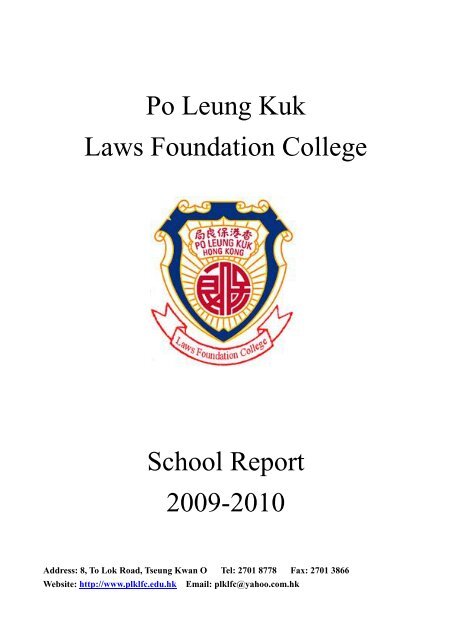

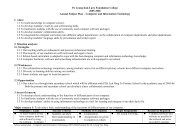
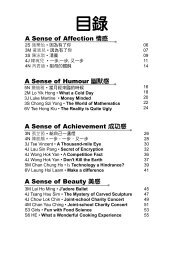
![Page 1 Page 2 Page 3 ããä¸çæ¯å¹³çãTheWorIdiSf]at)ã ä½è
湯馬 æ¯ ...](https://img.yumpu.com/49083939/1/184x260/page-1-page-2-page-3-aaacaeacatheworidisfata-a-1-2-eaee-ae-.jpg?quality=85)
